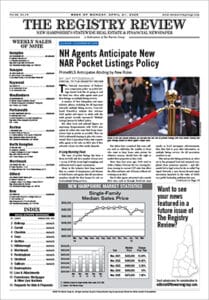A top real estate industry trade group got to take a victory lap recently as federal banking regulators announced some rule changes around how banks will be required to deal with a wave of office loans that are maturing just as future demand for office space looks shaky.
The FDIC, Office of the Comptroller of the Currency, the National Credit Union Administration and the Federal Reserve issued a joint guidance statement that says banks and credit unions can – and should, if a borrower’s financial condition can justify it – find short-term ways to modify troubled commercial real estate loans.
The new document will get layered on top of a 2009 guidance document that promises regulators won’t criticize financial institutions for modifying troubled commercial real estate loans after doing a “comprehensive review” of a borrower’s financial condition even if the loans are later classified as impaired. The 2009 guidance also says loans won’t be classified as impaired just because the value of the building they’re tied to drops below the outstanding loan balance, just so long as the borrower is still able to pay their debts according to “reasonable terms.”
The new piece in the document: “Timely” short-term modifications to CRE loans are encouraged to help a borrower through a period of financial stress, but before a loan reaches the workout stage.
“These actions can mitigate long-term adverse effects on borrowers by allowing them to address the issues affecting repayment ability and are often in the best interest of financial institutions and their borrowers,” the banking regulators’ new guidance says.
Several trade groups welcomed the announcement, first among them the Real Estate Roundtable. That national commercial real estate trade group, whose board is chaired by Boston construction magnate John Fish of Suffolk Construction, had been lobbying regulators to give banks flexibility in handling troubled office loans as worries mount that the value of downtown office real estate could fall amid what appears to be a stalling of “return to office” momentum. Commercial real estate debt research firm Trepp had graded Greater Boston office loans as being among the nation’s riskiest in this environment.
“We enthusiastically welcome and applaud the action of federal regulators to accommodate commercial real estate borrowers and lenders as the industry endures a time of historic, post-pandemic transition,” Roundtable President and CEO Jeffrey DeBoer said in a statement. “Maturing office loans in particular face a new environment of higher operating and financing costs, much tighter bank lending requirements, and uncertainty in business space needs. This major step forward by federal regulators provides the flexibility The Roundtable has encouraged, and the relief many in the industry need, as the economy and communities struggle to move beyond the repercussions of the global pandemic.”
New Hampshire’s office sector had seen relatively stable conditions over 2022, but two major class A submarkets saw big jumps in vacancy rates according to Colliers research. The 4.53 million-square-foot Portsmouth submarket saw its vacancy rate end the first quarter at 13.1 percent as Bottomline Technologies left its 100,000-square-foot headquarters on Corporate Drive in Portsmouth and Vapotherm leaving its 75,000-square-foot space. And the 1.09 million-square-foot Salem submarket saw its vacancy rate hit 23.5 percent as DCP left its longtime 113,000-square-foot space on Northeastern Drive in Salem.
In the 8.39 million-square-foot Manchester submarket, the state’s biggest, saw a vacancy rate of merely 7.4 percent and over 57,000 square feet of positive absorption in the first quarter, including 106,604 square feet of class B space absorbed.

